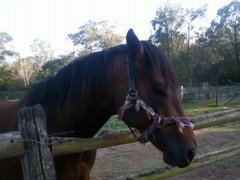Okay, I am really going to gross you out with this post.
Horses have very keen sense of smell. Each horse smells slightly different to the next. You may not be able to smell the difference, but each horse knows the other through a sense of smell. They also know you after a while by your sense of smell. Vegetarian humans also smell different to meat eaters, and will also behave somewhat differently to vegetarian humans.
Horses learn alot about their environment by smelling it. When we first move to the farm and let the colt walk around by himself, he went everywhere and just smelled everything. The house, the trees, the new garbage bins, the cement, the car, the garage, the stables, the food shed everything. It took him a long while to go around to absolutely everything and smell it.
I said in my last article about letting a horse smell things that you want him to get used to. This is because if a thing smells "normal" it wont be so spooky as a thing that is not smelled. I teach all my horses to respond to the word "smell" so that if something is held out to them, they will smell it. You might think this rather obvious, but if I don't say "smell" they will sometimes shy away from it, especially if it makes a noise as well.
Horses also smell where they urinate and where they drop their manure. This is to check that another stallion has not come along since last they were there and left a scent.
When the colt was three days old he watched his mother urinate, then stood over it, pulled his upper lip back with his head in the air and urinated over it himself. (He was a colt!)
A stallion will pass manure when he is excited, stressed badly, in severe pain or just plain to show off. He will only drop a few balls of it, but it is there, ready and waiting for when he needs it. It is his signature.
It will smell of him, and be a signal for any other horse that comes by "foo was here".
When horses have been away from each other for a while, they will smell nostrils on return, and smell the tactile hairs that are on their faces. These hairs must pick up chemicals and smells from wherever the horse has been and will tell the story of what has happened. The little snorts and pawing are just reasserting their relationship. (I am not one of those who subscribe to the horse pecking order theory of horse relationships.)
So next time you interact with your horse, try smelling it and letting it smell you - especially your hair as it tells interesting stories.
There are many ways into a horse's mind and heart, these are some of my ideas ...
Friday, June 29, 2007
Subscribe to:
Post Comments (Atom)


No comments:
Post a Comment